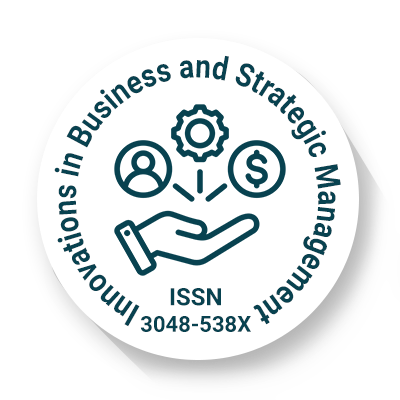
Innovations in Business and Strategic Management
OPEN ACCESS
ISSN: 3048-538X

OPEN ACCESS
ISSN: 3048-538X
Innovation is the foundation of advancement in the business sector. Companies must constantly rethink their plans, adopt new technologies, and adjust their approaches to be competitive in the fast-paced global economy. Business innovation encompasses more than just developing new goods or services; it also includes process enhancements, organizational structure modifications, and tactical shifts that promote long-term success. Businesses that embrace innovation become the market leaders as sectors change and customer expectations rise.
Business innovation is essentially the conception and use of novel concepts that enhance customer satisfaction, efficiency, and effectiveness. It is the impetus behind game-changing innovations in market strategy, new company models, and breakthrough technologies. Successful innovation requires vision, flexibility, and an unwavering dedication to continuous development. Businesses that embrace innovation can ensure long-term success through improved supply chain management, digital transformation, or innovative consumer interaction strategies.
Business innovation comes in many forms. The goal of product innovation is to create new or drastically enhanced products to meet shifting consumer needs, such as bettering functionality, design, or technology. Process innovation makes production, automation, and internal processes more effective, economical, and optimal. Restructuring income streams, distribution networks, and pricing models to conform to evolving market realities is known as business model innovation. To increase involvement and brand loyalty, marketing innovation introduces fresh ideas for branding, advertising, and consumer interaction. Organizational innovation involves rearranging management systems, work environments, and collaboration mechanisms to increase productivity and satisfaction among employees.
Technological progress has transformed the way companies conduct business. Blockchain technology, artificial intelligence, the Internet of Things, and big data analysis have altered decision-making, productivity, and the consumer experience. Businesses may foresee trends, customize the user experience, and streamline procedures by automating tasks with insights and recommendations powered by artificial intelligence. The digital revolution has fueled e-commerce, remote working environments, and cloud-based applications, resulting in industry-wide innovation.
Although business innovation provides advantages, it also faces a variety of hurdles. The main obstacles are market acceptability uncertainties, implementation costs, and resistance to change. Organizations should invest in R&D, promote creative problem-solving, and cultivate an adaptive culture to best handle these issues. Regulation compliance and ethics must also be addressed to achieve responsible innovation.
Digitalization, sustainability, and customer-focused initiatives are the pillars of corporate innovation in the future. The advantage will go to those who concentrate on environmental, social, and governance (ESG) challenges. When cutting-edge technology and human creativity are combined, unparalleled innovation will be unleashed, changing industries for decades. Businesses with an inventive, forward-thinking culture will thrive in a world of transition as new markets open up and the world becomes smaller.
Business innovation is not just being fashionable; it is an essential component of organizations that want to remain contemporary in an ever-changing world. By creating an environment that values innovation, through harnessing technological innovation, and adapting to the demands of the marketplace, organizations can discover new horizons and achieve sustainable growth. Success is achieved through embracing change, challenging the conventions, and continually striving for excellence in an ever-changing situation.